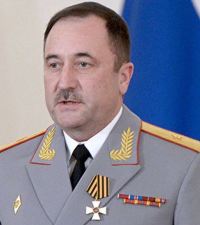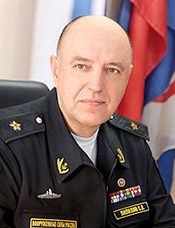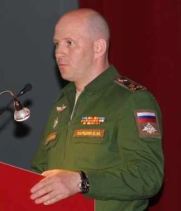RF President Putin signed out his promotion list for Defenders’ Day on February 22. He was generous to the MOD.
Twenty-seven officers were promoted to or within the general and flag ranks: one four-star, two three-star, six two-star, and 18 one-star promotions were handed out.
Putin’s National Guard got few promotions this time.
The big news, already discussed, was Ground Troops CINC Salyukov’s new army general (O-10) rank.
Main Combat Training Directorate Chief Ivan Buvaltsev and Central MD Commander Aleksandr Lapin became general-colonels.
Four new general-lieutenants included new 8th CAA Commander Andrey Sychevoy, 11th Army Corps Commander Yuriy Yarovitskiy, 68th Army Corps Commander Dmitriy Glushenkov, and 45th Air and Air Defense Army Commander Aleksandr Otroshchenko.
Just shy of 50, Sychevoy seems to be a mover. But he also appears to be camera shy, so no photo.
Yarovitskiy in the Baltic Fleet’s 11th Army Corps served in the First Chechen War and was chief of staff, first deputy commander of the 1st Tank Army, according to one bio.

Yuriy Yarovitskiy as a one-star
New vice-admirals are Deputy Commander of the Black Sea Fleet Sergey Lipilin and a deputy chief of the NTsUO.

Lipilin wearing rear-admiral
New one-stars included the:
- Chief of Staff, First Deputy Commander, 5th CAA;
- Commander, 4th Air Defense Division;
- Commander, 18th Machine Gun-Artillery Division;
- Commander, 57th Motorized Rifle Brigade;
- Chief, Recce Directorate, Central MD;
- Chief; Organization-Mobilization Directorate (OMU), Eastern MD;
- Chief, Combat Training Directorate, Southern MD;
- Chief, EW Service, Eastern MD;
- Chief, OMU, Northern Fleet;
- Chief, 9th Directorate, MOD;
- Deputy Chief, Military Academy of Radiological, Chemical, and Biological Defense (RKhBZ) Troops.
Headed by newly minted General-Major Sergey Parshin, the MOD’s 9th Directorate is one of the Russian military’s more secretive elements. It designs and builds silos, launch positions, command, control, and communications networks, and underground command posts and bunkers for the RVSN and Russia’s missile defense system.

Parshin as a colonel
There were seven promotees for which a position couldn’t be identified at this time.

